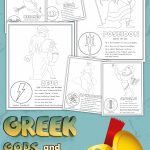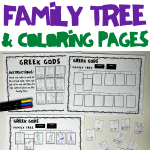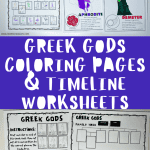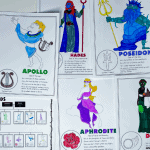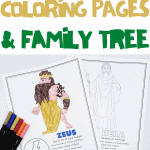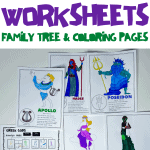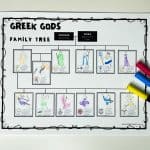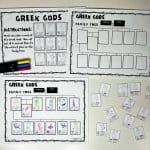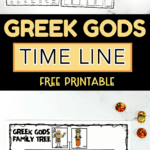Free Printable Greek Gods Family Tree Worksheet
The Greek gods family tree worksheet is a fantastic tool for introducing young learners to the fascinating world of Greek mythology.
By using a family tree format, this worksheet helps children visualize the relationships between gods and goddesses, making it easier to understand who they are and how they fit into ancient mythology.
The interactive nature of this free homeschool printable, with activities like cutting, pasting, and filling in blanks, provides a fun and engaging way for students to learn about these mythological figures.
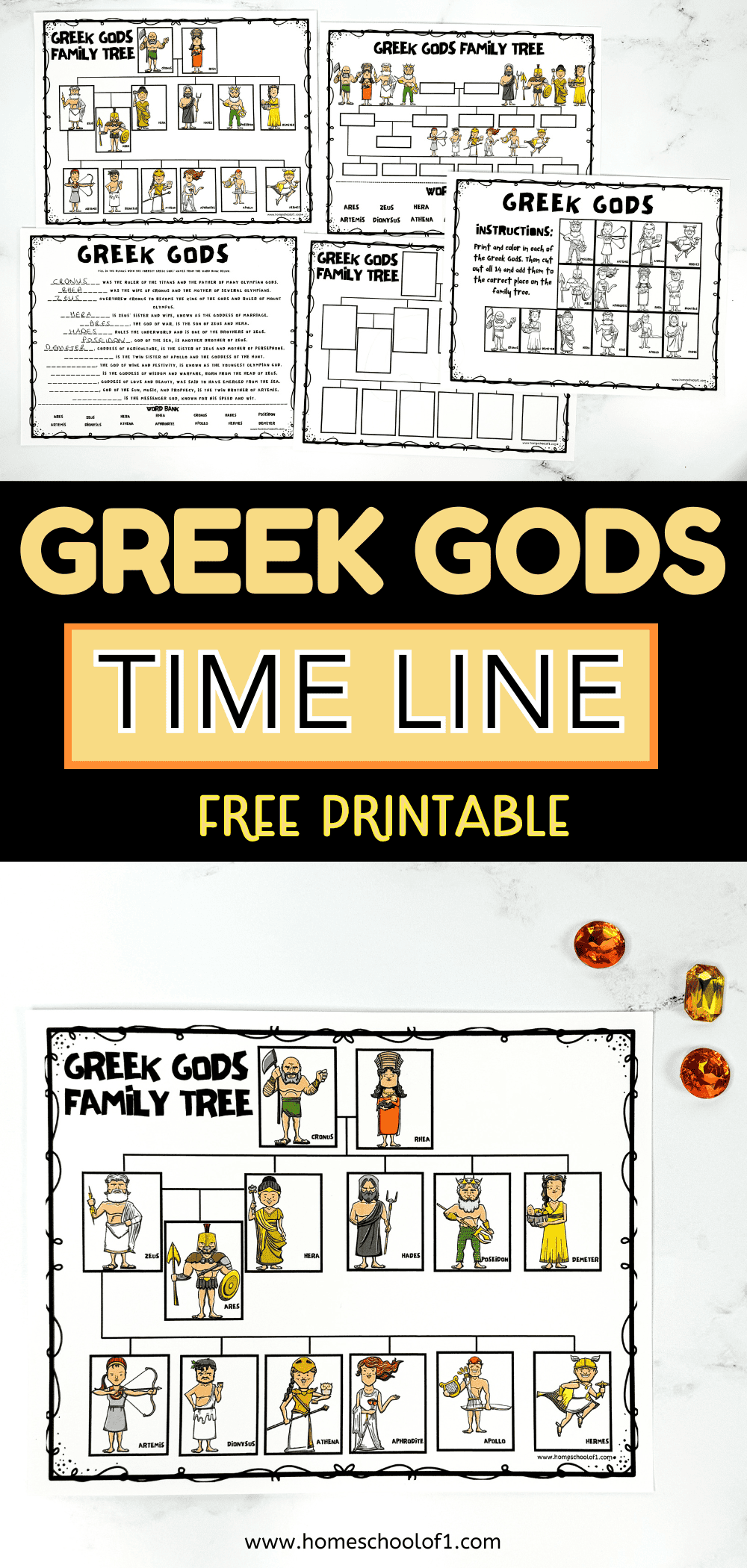
**This post may contain affiliate links. As an Amazon Associate and a participant in other affiliate programs, I earn a commission on qualifying purchases.**
Greek mythology worksheets
The Greek Gods coloring pages include several interactive elements that make learning both enjoyable and effective for kids.
The Greek mythology family tree printable visually represents the connections between important gods such as Cronus, Rhea, Zeus, Hera, Poseidon, and others. It allows students to see how the gods are related and which ones are part of the same divine family.
Students are instructed to place the names of the gods in their correct spots on the tree, making it a hands-on learning experience.
A word bank is provided to help students as they work on the family tree. This list includes the names of all the major gods featured in the activity, making it easier for students to accurately complete the task.
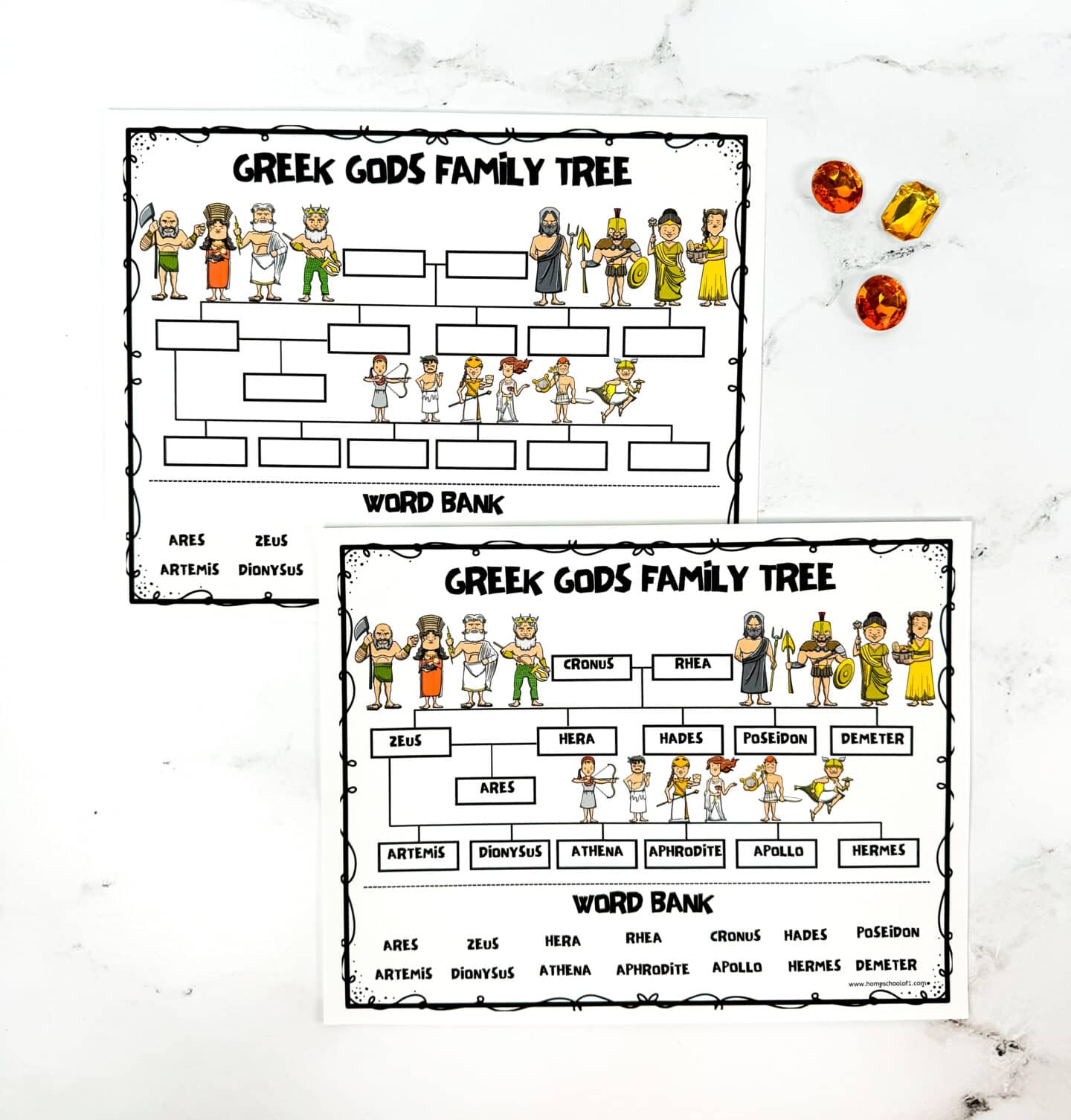
Students are encouraged to cut out the names or images of the gods and place them on the family tree. This tactile element adds a fun and creative aspect to the learning process, allowing kids to engage more deeply with the content.
To further reinforce their knowledge, students complete fill-in-the-blank sentences about the Greek gods. For example, they might be asked to fill in, “______ is the god of the sea and a brother of Zeus.” This exercise challenges students to apply what they’ve learned about each god’s role and relationships.
Educational benefits of the Greek Mythology family tree worksheet
The Greek mythology family tree for kids provides numerous educational benefits for young learners. It offers a balanced mix of creativity, critical thinking, and hands-on learning.
Greek mythology is filled with intricate relationships between gods, which can be difficult to grasp. The family tree simplifies this by visually showing parent-child and sibling connections, helping students make sense of these complex relationships in a straightforward way.
The cut-and-paste activity allows students to actively participate in their learning by placing gods in their rightful spots on the tree. This creative task helps reinforce understanding while making the learning process more enjoyable. Coloring the gods is another fun option that adds to their engagement.
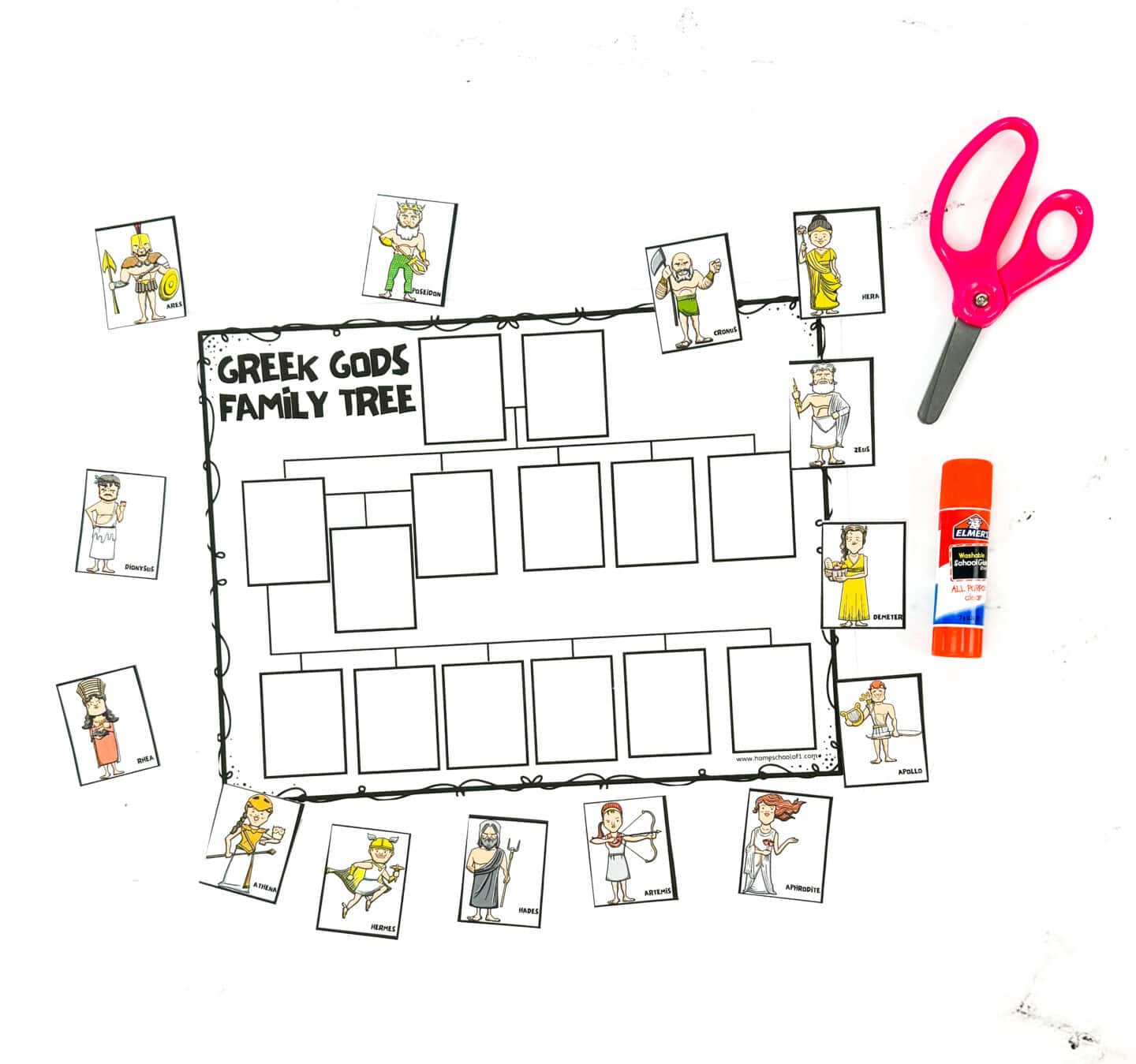
The fill-in-the-blank questions challenge students to recall information about the gods and apply it to complete the sentences. This activity strengthens memory and comprehension while also developing critical thinking as students figure out which gods belong to which roles.
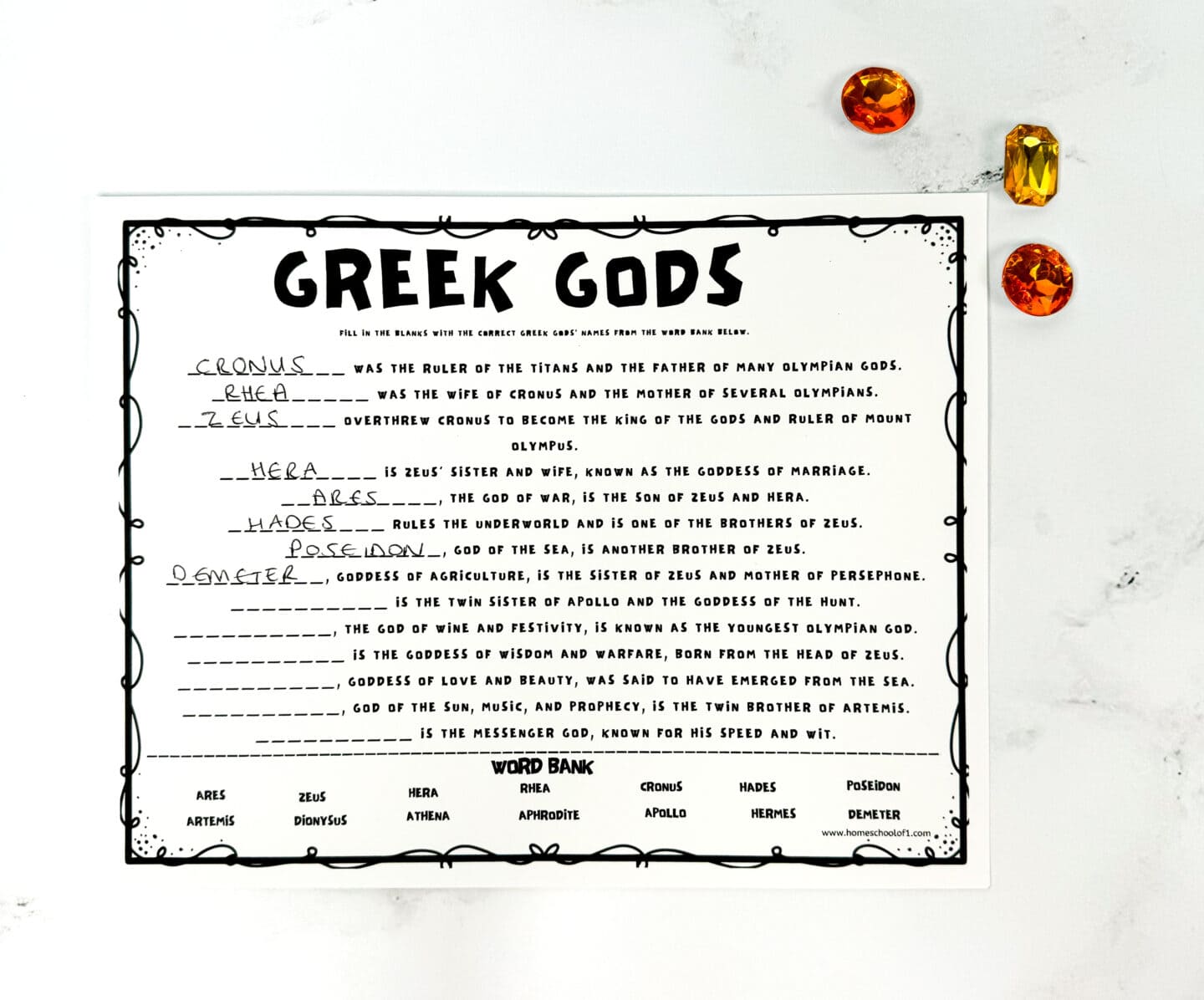
The clear instructions and interactive elements make this worksheet ideal for independent study. Students can work on the activities at their own pace, which builds confidence and self-reliance in navigating new material.
Practical applications for the worksheet
The Greek gods family tree printable is a versatile resource that can be used in various educational settings:
Teachers can incorporate this worksheet into mythology units as a fun, interactive activity. Students can work individually or in groups to complete the family tree and fill-in-the-blanks, making for a collaborative and engaging classroom experience.
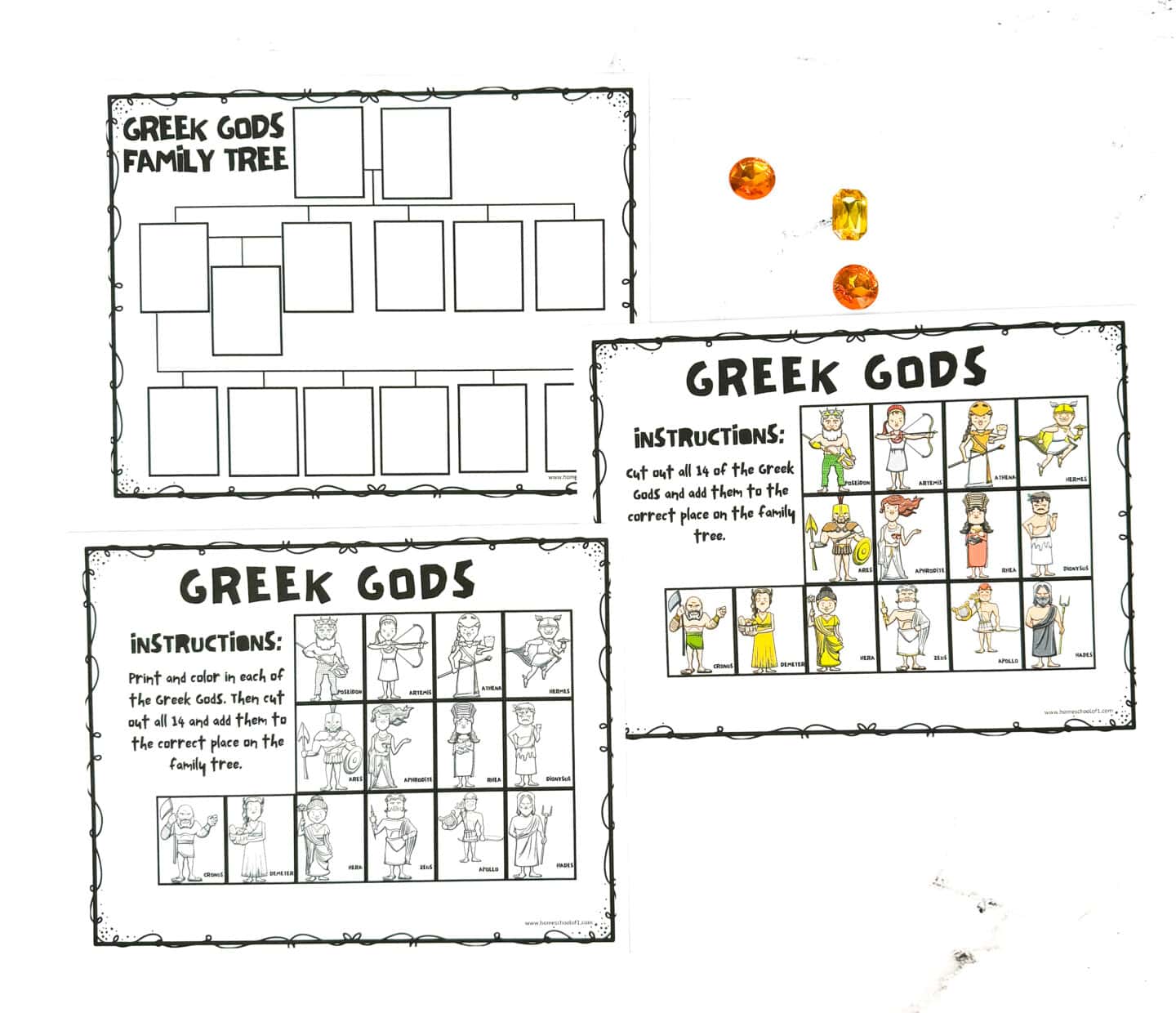
This worksheet is perfect for homeschooling parents looking to introduce Greek mythology in a hands-on and accessible way. The activities are easy to follow and encourage active participation, making learning at home more interactive and enjoyable.
For students already familiar with Greek mythology, the worksheet can serve as a helpful review or reinforcement tool. It provides a simple way to revisit the relationships between gods while offering a creative approach to learning.
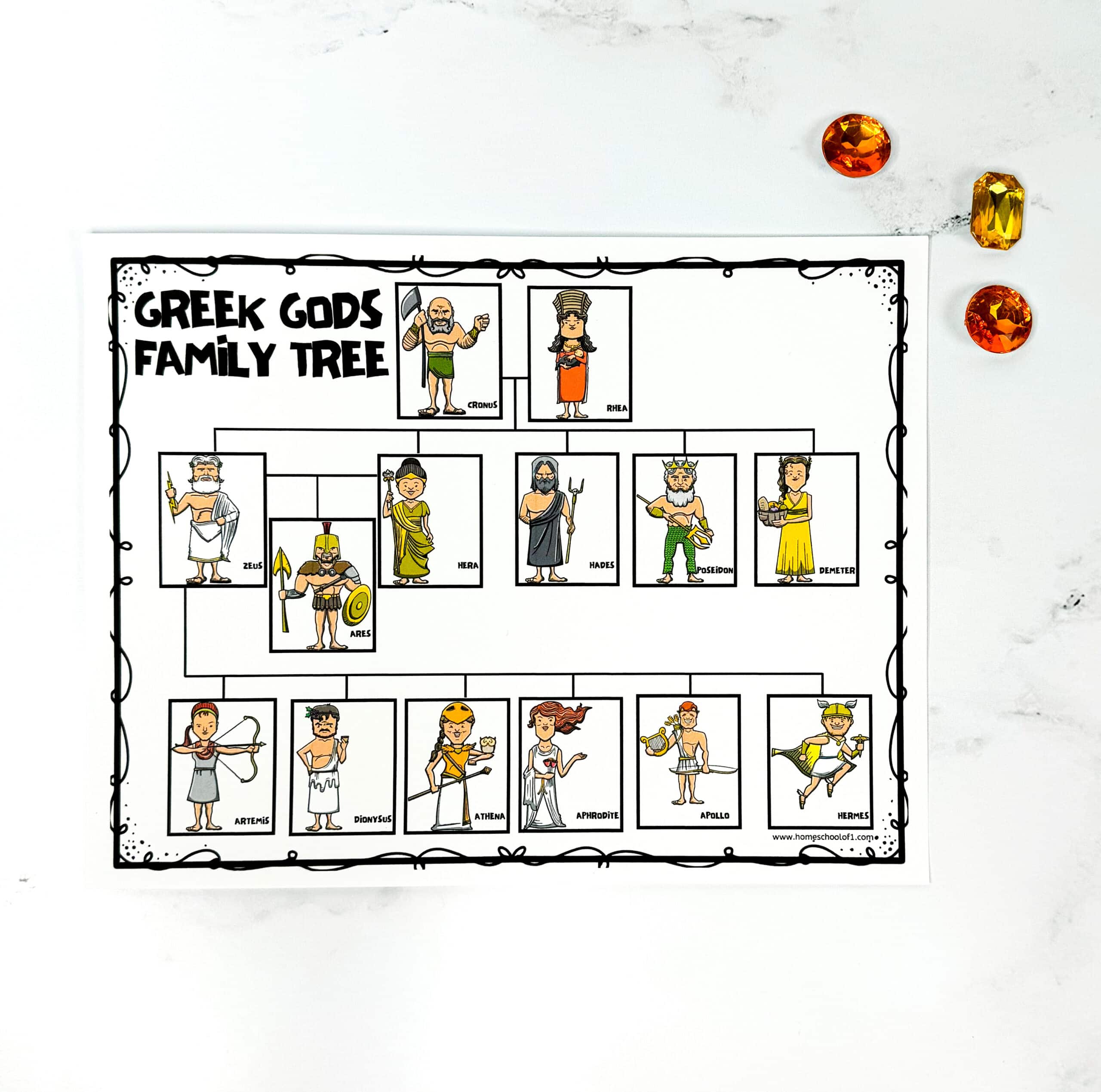
How to learn Greek Mythology with the kids
Teaching Greek mythology to kids can be a fun and engaging experience, sparking their imagination and curiosity about ancient stories and cultures. Here’s a step-by-step guide on how to do it effectively:
- Begin by introducing the concept of mythology and explaining that it’s a collection of stories that people in ancient times used to explain things they didn’t understand. Mention that Greek mythology is from ancient Greece and includes stories about gods, goddesses, heroes, and creatures.
- Select stories and resources that are suitable for the age and maturity level of the kids. There are various children’s books, cartoons, and online resources specifically designed for different age groups.
- Introduce them to some of the most well-known gods, goddesses, and heroes in Greek mythology. Start with a few important ones like Zeus, Athena, Poseidon, Hercules (Heracles), and Perseus. Share their unique attributes and roles.
- Illustrated books can make the stories more captivating for kids. Look for books that have colorful and engaging illustrations to help bring the characters and events to life.
- Narrate the stories in an engaging and animated manner. Add excitement to the narrative with varying tones of voice and expressions. You could also act out parts of the stories to make them more memorable.
- Include hands-on activities that correspond to the stories. For instance, after learning about Perseus and his quest to defeat Medusa, have the kids create their own Medusa masks using craft materials.
- Make a chart or poster with the names of gods, goddesses, and heroes along with their attributes and symbols. This visual aid will help kids remember the characters and their roles.
- There are many educational videos and cartoons available that present Greek mythology in a child-friendly way. These videos often simplify complex concepts and make them more accessible.
- Design simple games like trivia quizzes or memory games based on Greek mythology. This makes learning fun and interactive.
- After learning about different characters and stories, encourage kids to create their own stories or artworks inspired by Greek mythology. This could involve writing short stories, drawing, or even creating their own mythological creatures.
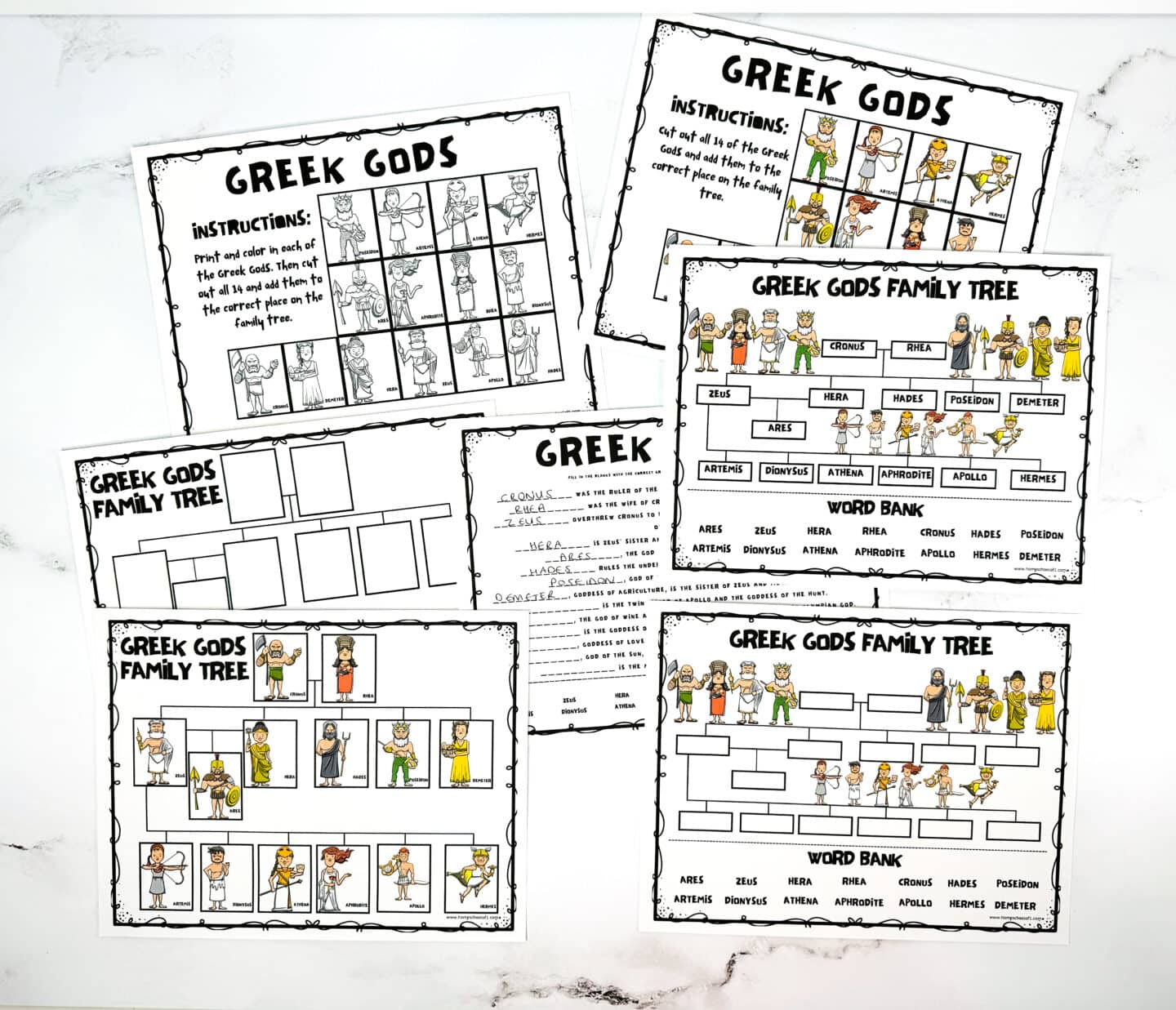
Best Greek mythology books for kids
The best Greek mythology books for kids are:
- Treasury of Greek Mythology: This book, often beautifully illustrated, compiles a wide range of Greek myths into one volume. It covers not only the major gods and heroes but also introduces readers to lesser-known characters and creatures. The narratives are often adapted for younger readers while retaining the essence of the original tales.
- National Geographic Kids Everything Mythology: This book combines the fascination of mythology with a visually engaging layout. It provides an interactive exploration of myths from various cultures, including Greek mythology. It’s filled with facts, photos, illustrations, and even activities that make learning about myths both informative and fun.
- Percy Jackson’s Greek Gods: Written by Rick Riordan, the author of the immensely popular Percy Jackson series, this book presents Greek mythology through Percy Jackson’s humorous and engaging voice. It offers retellings of the Greek myths with a modern twist, making them relatable and entertaining for young readers who might already be familiar with the Percy Jackson series.
- The Olympians series is a set of graphic novels that dives into the stories of individual Greek gods and goddesses. The series combines captivating artwork with engaging narratives, providing an accessible way for kids to learn about the myths. Each book focuses on a specific deity and their role in Greek mythology.
Who are the 12 Greek Gods?
The 12 Greek and Goddess’ names and powers can be seen below. The first name is the Greek name, and the second name in parenthesis is their Roman name.
- Zeus (Jupiter) is the God of the sky & thunder. Married his sister Hera, and was the King of the Gods. Learn more about Zeus with our free Statue of Zeus at Olympia worksheet.
- Hera (Juno) Goddess of marriage and is the Queen of the Gods.
- Poseidon (Neptune) God of the sea.
- Athena (Minerva) Goddess of Wisdom is the daughter of Zeus.
- Demeter (Ceres) Goddess of Agriculture.
- Artemis (Diana) Goddess of hunt & moon, the twin sister of Apollo, and daughter of Zeus.
- Hades (Pluto) God of the Underworld is the older brother of Zeus.
- Hermes (Mercury) God of trade & thieves is the son of Zeus.
- Apollo (Apollo) God of the sun, the twin brother of Artemis, and son of Zeus.
- Dionysus (Bacchus) God of parties & vegetation is the son of Zeus.
- Ares (Mars) God of War is the son of Zeus and Hera.
- Aphrodite (Venus) Goddess of love & beauty is the daughter of Zeus.
Additional Greek mythology worksheets
- Discover the fascinating world of the Greek Gods with our diverse range of Greek mythology worksheets.
- Our Greek mythology coloring worksheets offer a creative way to engage with ancient legends.
- Enhance your understanding of Greek mythology through our interactive Ancient Greece word scramble and Greek Mythology word search.
- After exploring the family tree of the gods in Greek mythology, students can creatively express their learning by designing their own family tree coloring page.
Need to print later? Add this to your Pinterest board or share it on Facebook. You’ll have it handy whenever you’re ready to use it!
Get the free Greek mythology family tree pdf here!
Ready to grab your free printable? Just pop your name and email into the form below, and it’s all yours!
I think you will also enjoy our free periods in English literature a timeline printable.
Last Updated on 9 April 2025 by Clare Brown

